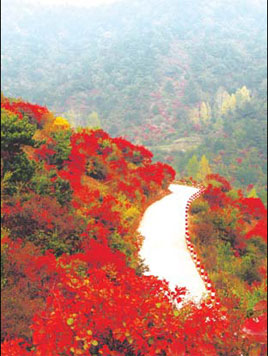The town that shaped a Confucian thinker
A landmark 28-meter-tall statue of Xun overlooks Anze's Xun Zi Cultural Park, a 47-hectare spread of temples, memorial squares and a great hall exhibiting his works and life stories.
|
Autumn turns Smoke Trees into a flaming sea. |
The statue can be reached by car or climbing a footpath of 980 stone steps. The buildings inside the park were built in the Warring States Period (475-221 BC) style.
The festival attracts both domestic and overseas tourists, and scholars studying the theories of Confucianism.
Unlike many idealistic Confucianists, like Mencius, who claimed all humans were inherently good, Xun argued that humans need a good education and should be guided by laws.
Born in the Warring States Period, Xun's philosophy was influential at the time.
Little is known about Xun's early life. He taught in the State of Qi, in present day Shandong province, and his two most notable students were Li Si and Han Fei Zi, who later developed a doctrine called the School of Law or Legalism.
One of Xun's most important legacies is his 32-chapter book Xun Zi, in which he discussed philosophy, logic, politics, social ethics and many other aspects of human society.
The annual festival comprises a calligraphy exhibition, seminars and the ceremony, which this year included hundreds of dancers dressed in traditional imperial Chinese costumes.
About 20 km away from downtown Anze the well-preserved natural environment is a magnet for rare birds like storks.
Driving the mountain roads in the cool air, under the golden sunlight melting into the autumn leaves, is a relaxing experience, quite different from watching the leaves turn color in overpopulated Fragrant Hills, in Beijing.
China Daily
(China Daily 11/11/2010 page19)
Copyright 1995 - 2010 . All rights reserved. The content (including but not limited to text, photo, multimedia information, etc) published in this site belongs to China Daily Information Co (CDIC). Without written authorization from CDIC, such content shall not be republished or used in any form. Note: Browsers with 1024*768 or higher resolution are suggested for this site.


